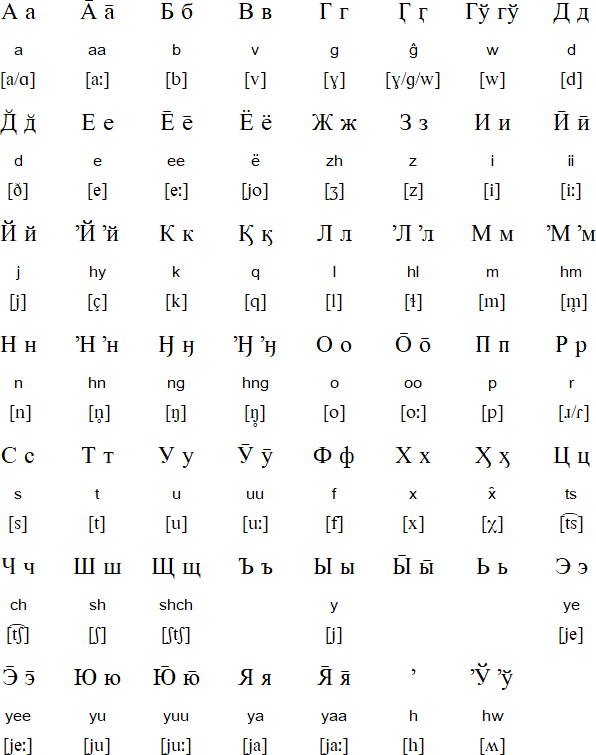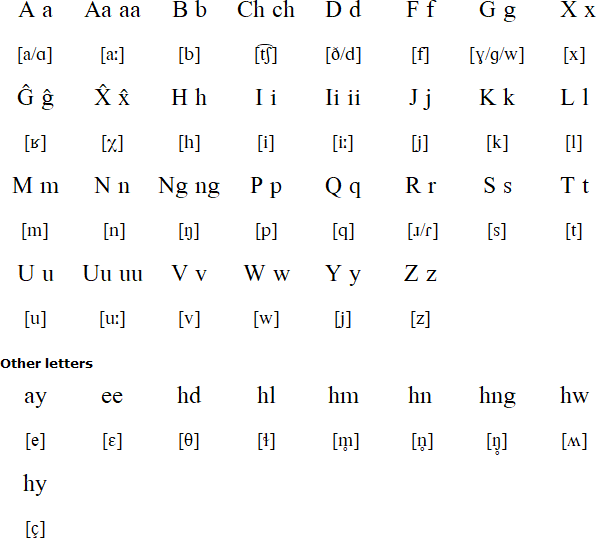Aleut is a member of the Eskimo-Aleut language family. It is spoken on the Alaskan Peninsula, and in the Aleutian, Pribilof and Commander Islands. Most of the Aleutian Islands are part of the state of Alaska in the USA, while some are in Kamchatka Krai, part of the Russian Federation. The Pribilof Islands are also part of Alaska, and the Commander Islands, or Командорские острова, are part of Kamchatka Krai.
In 2007 there were about 150 speakers of Aleut in Alaska, and there were five Aleutian speakers in Russia in 2010. A language known as Copper Island Aleut or Medny Aleut, which is a mixture of Attuan and Russian, is spoken by about 350 people in the Commander Islands and Copper Island.
There are three groups of Aleut dialects: Eastern Aleut, Atkan and Attuan. The most spoken dialect is that of Pribilof Island, part of Eastern Aleut.
During the 19th century, when Alaska was part of Russia, Aleut was written with a version of the Cyrillic alphabet by a Russian Orthodox priest, Ioann Veniaminov (1797-1879), who was later made a saint - Saint Innocent of Alaska. Veniaminov started working with the Aleut in 1824, translated parts of the Bible and other religious works into Aleut, and in 1846 he published a grammar of Eastern Aleut.
The Latin orthography for Aleut was developed during the second half of the 20th century by Knut Bergsland who worked with William Dirks Sr., Moses Dirks, and other Aleut speakers. Bergsland produced a comprehensive Aleut dictionary in 1994, and a detailed grammar in 1997.


Download alphabet charts for Aleut (Excel)
Corrections and additions by Michael Peter Füstumum
Al hamaax anĝaĝinax̂, haman qalgadax̂ taxsaqax̂ aguun. taxsaqax̂ ax̂taguun, qan'gim silan, wan tugidam hulax̂tanaa inal aguun, slax̂ hawaan, huzugaan maqat maqadaĝaan mal, anĝaĝinam qaatunanginiin chisilgaqalizaqax̂.
But towards winter, at the end of this month when the weather generally
changes, the food that had been stored was distributed to the hungry
people, to everyone.'
(Niiĝuĝis Maqax̂tazaqangis / Atkan Historical Traditions, p. 4-5)
Anĝaĝinam huzungis agaxtakuu ingisxigikux̂ ama liidax̂ nagan sahnganaxtada. Txin sakaaĝatal anagis mataxchx̂ida inaqamchix̂ agangudaganasaaĝiiĝutakus ludaangan huzuu ngaan quĝasaatakus.
Translated into Aleut by Halluuq Ungungai
All human beings are born free and equal in dignity and rights. They
are endowed with reason and conscience and should act towards one another
in a spirit of brotherhood.
(Article 1 of the Universal Declaration of Human Rights)
Information about Aleut | Phrases | Numbers | Tower of Babel
Information about the Aleut language
http://www.uaf.edu/anlc/languages/al/
http://en.wikipedia.org/wiki/Aleut_language
Niiĝuĝim Tunugan Ilakuchangis - Introduction to Atkan Aleut Grammar and Lexicon
http://www.ankn.uaf.edu/ANCR/Aleut/Atkan2/
Information about Saint Innocent of Alaska (Ioann Veniaminov)
http://www.allsaintsofamerica.org/orthodoxy/innocent.html
http://www.oca.org/HSbioinnocent.asp?SID=7
Alaskan Orthodox texts (Aleut, Alutiiq, Tlingit, Yup'ik). An ongoing project
offering Alaskan Orthodox texts on-line in their original languages and alphabets
http://www.asna.ca/alaska/
Alaskan Native Heritage Center
http://www.alaskanative.net
Aleut, Alutiiq, Greenlandic, Inuktitut, Inuktun, Iñupiaq, Sirenik, Yup'ik (Central Alaskan), Yupik (Central Siberian)
Abaza, Abkhaz, Adyghe, Aghul, Akhvakh, Akkala Sámi, Aleut, Altay, Alyutor, Andi, Archi, Assyrian / Neo-Assyrian, Avar, Azeri, Bagvalal, Balkar, Bashkir, Belarusian, Bezhta, Bosnian, Botlikh, Budukh, Bulgarian, Buryat, Chamalal, Chechen, Chelkan, Chukchi, Chulym, Chuvash, Crimean Tatar, Dargwa, Daur, Dolgan, Dungan, Enets, Erzya, Even, Evenki, Gagauz, Godoberi, Hinukh, Hunzib, Ingush, Interslavic, Itelmen, Juhuri, Kabardian, Kaitag, Kalderash Romani, Kalmyk, Karaim, Karakalpak, Karata, Karelian, Kazakh, Ket, Khakas, Khanty, Khinalug, Khorasani Turkic, Khwarshi, Kildin Sámi, Kili, Komi, Koryak, Krymchak, Kryts, Kubachi, Kumandy, Kumyk, Kurdish, Kyrgyz, Lak, Lezgi, Lingua Franca Nova, Lithuanian, Ludic, Macedonian, Mansi, Mari, Moksha, Moldovan, Mongolian, Montenegrin, Nanai, Negidal, Nenets, Nganasan, Nivkh, Nogai, Old Church Slavonic, Oroch, Orok, Ossetian, Pontic Greek, Romanian, Rushani, Russian, Rusyn, Rutul, Selkup, Serbian, Shor, Shughni, Siberian Tatar, Sirenik, Slovio, Soyot, Tabassaran, Tajik, Talysh, Tat, Tatar, Teleut, Ter Sámi, Tindi, Tofa, Tsakhur, Tsez, Turkmen, Tuvan, Ubykh, Udege, Udi, Udmurt, Ukrainian, Ulch, Urum, Uyghur, Uzbek, Veps, Votic, Wakhi, West Polesian, Xibe, Yaghnobi, Yakut, Yazghulami, Yukaghir (Northern / Tundra), Yukaghir (Southern / Kolyma), Yupik (Central Siberian)
Languages written with the Latin alphabet
Page last modified: 17.11.22
[top]
You can support this site by Buying Me A Coffee, and if you like what you see on this page, you can use the buttons below to share it with people you know.

If you like this site and find it useful, you can support it by making a donation via PayPal or Patreon, or by contributing in other ways. Omniglot is how I make my living.
Note: all links on this site to Amazon.com, Amazon.co.uk
and Amazon.fr
are affiliate links. This means I earn a commission if you click on any of them and buy something. So by clicking on these links you can help to support this site.
[top]